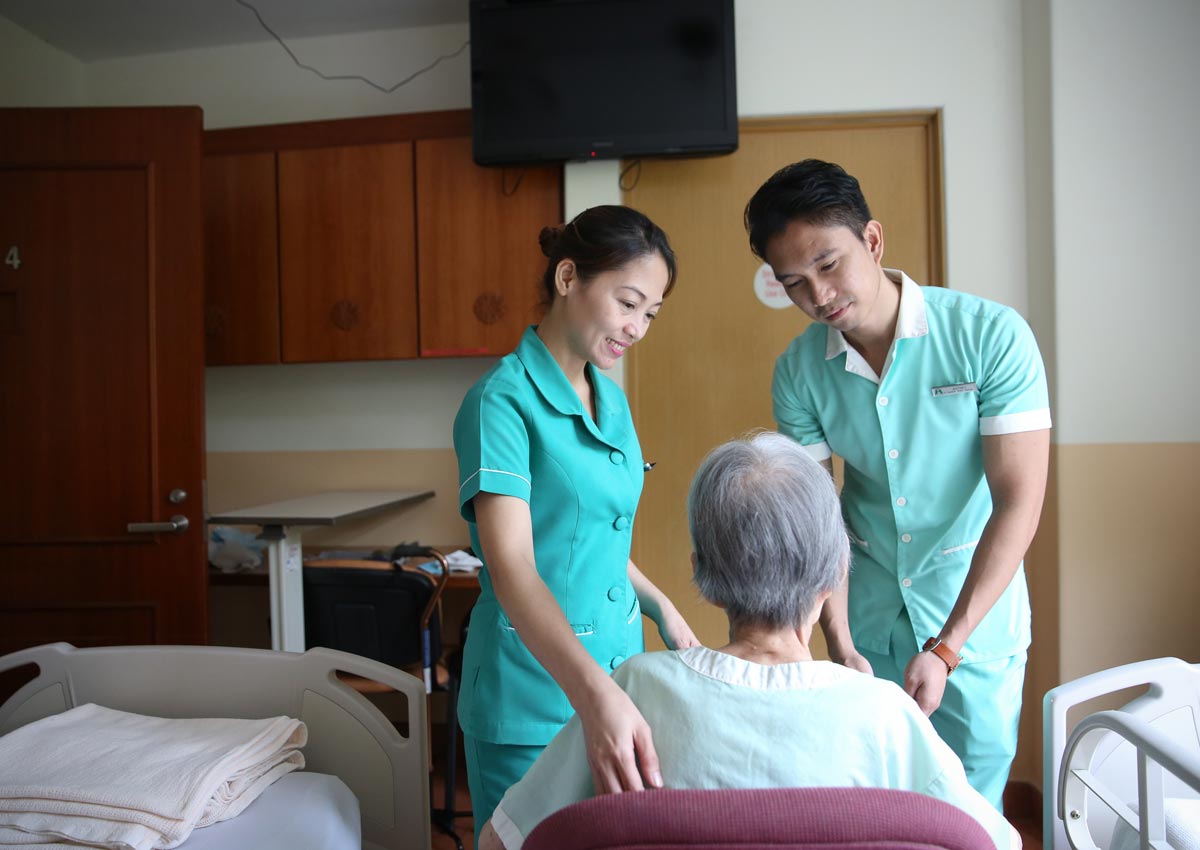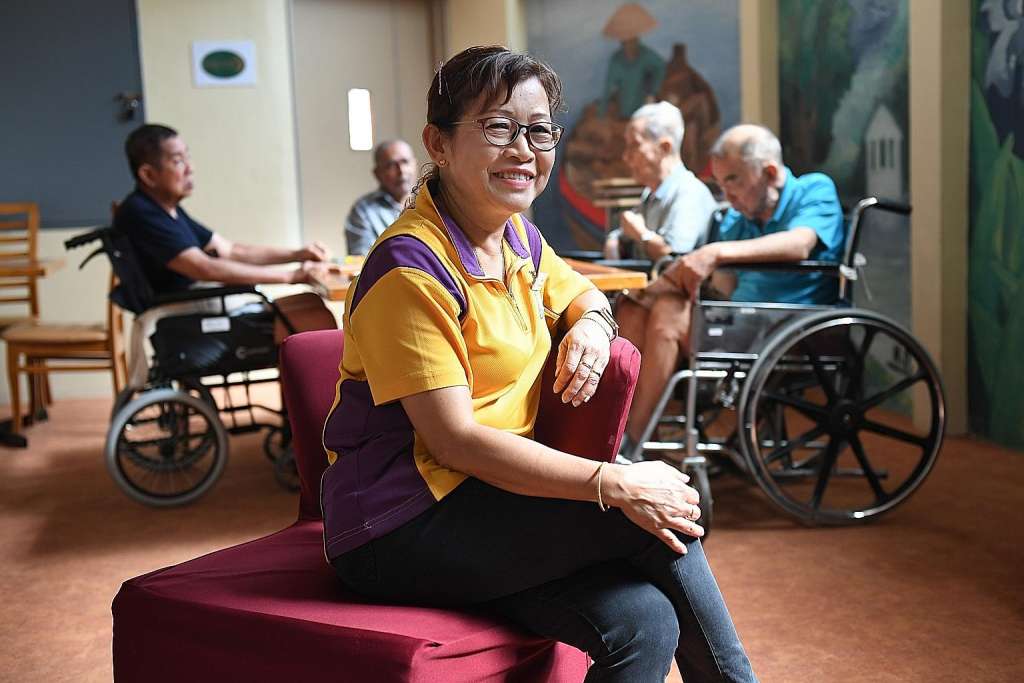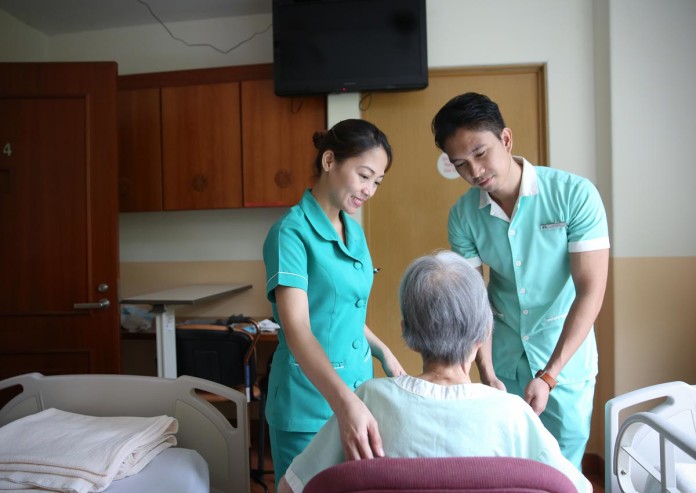Some 10,000 healthcare workers are needed in the next three years to look after the swelling ranks of ageing Singapore residents.
More than one-third of the vacancies will be for professional, managerial, executive and technical (PMET) jobs such as doctors, nurses, facility managers and administrative staff, the Ministry of Health (MOH) tells The Sunday Times.
The ministry last month announced it needed 30,000 healthcare workers overall by 2020, and has now updated this to state that of these, 10,000 are required for the eldercare sector alone.
The vacancies will be filled by both local and foreign workers, says a ministry spokesman.
Asked how this will be achieved, MOH says: “We are ramping up efforts to build a stronger local core in the healthcare sector, such as investing in skills training and job redesign so that our healthcare workforce can do more at each level.”
It is also “expanding the training and recruitment pipeline to enable young job-seekers, mid-career entrants, former nurses and part-time workers to join the sector”.
But experts say a more pressing issue is to tackle why Singaporeans shun jobs in the healthcare sector.
Last week, a check of the government-run National Jobs Bank, where employers are required to post job vacancies before they can hire foreigners, found more than 800 job vacancies in the healthcare and pharmaceutical sectors (which are lumped together).
“There’s the unpleasant job at the lowest level, bathing and cleaning frail people,” says human resource consultant Martin Gabriel from HRMatters21. “Some people see it as a maid’s job.”
“To draw Singaporeans into the sector, there is a need to provide proper career progression and to minimise the parts of the job that are seen as unpleasant,” he adds.
Indeed, the Government acknowledged in 2012 that foreigners were going to take up the bulk of lower-end jobs such as feeding and bathing of patients that Singaporeans found unappealing.
“We expect that 70 per cent of the new support-care manpower demand, or 6,000 new positions, will need to be met through foreign recruitment,” wrote the Prime Minister’s Office in a research paper in November 2012 on the projection of foreign manpower demand in the healthcare sector.
Healthcare is part of the services sector where employers can hire two foreigners on work permits for every three full-time local workers. The Government has said that it will ensure flexibility in applying the cap so that healthcare institutions are able to fulfil their staffing needs, but it has never spelt out how the flexibility will be applied.
Meanwhile, efforts to fill the PMET vacancies in the sector with Singaporeans may get a push from an unexpected direction – the slowing economy.
“With growing concerns with the economy and jobs, healthcare is increasing in attractiveness,” says Dr Chia Shi-Lu, chairman of the Government Parliamentary Committee (GPC) for Health. “This is a pattern we see with previous economic downturns, as healthcare is traditionally viewed as a ‘safe’ haven where employment is concerned,” adds the orthopaedic surgeon at the Singapore General Hospital.
Mr Patrick Tay, chairman of the GPC for Manpower, says the stability of the healthcare jobs aside, another way of attracting Singaporeans to the sector is to streamline work and automate to raise productivity. “This will reduce the reliance on manpower,” says the long-time productivity advocate.
Member of Parliament Tin Pei Ling is optimistic that there will still be Singaporeans drawn to the sector (see story on Elena Lagman).
“Caring for the elderly requires the human touch,” says Ms Tin, who is a member of the GPC for Health. “There will continue to be those who find meaning and purpose in caring for the elderly, all of whom are Singapore’s pioneers.”
The local: Caring for the elderly feels like home
When Ms Elena Lagman retired from her job working in a family business five years ago, she wanted a job that involved working with people.
“I am a cheerful person and I like interacting with people,” says the 62-year-old.
She found a job as an activities coordinator at a pre-school and childcare centre, helping teachers mind their young wards. But a year later, she decided to switch to working in a nursing home.
“I enjoy looking after children, but I thought it would be more meaningful looking after older people, like I am looking after my parents,” she says.
She responded to an online job advertisement put up by Lentor Residence. Despite her lack of work experience in the field, she was hired as a patient-care assistant.
She was put through training, for example on how to transfer wheelchair users from the bed to the wheelchair, and handle those with dementia.
After working at the nursing home for four years, she now earns about $1,500 a month. “The salary is about the same as in childcare.”
She works from 9am to 6pm on Mondays to Fridays and alternate Saturdays, organising and co-ordinating activities.
When Insight visited her at the home last week, she was playing a Donkey card game with some residents.
“The game involves memory. It is a fun game to keep the mind alert,” says Ms Lagman.
When asked if it was difficult to switch from looking after children to seniors, she says with a laugh: “It is actually the same. Some of the residents, when they have dementia, they are forgetful like children.”
She adds: “My job is to keep them occupied through games and activities, that is also the same.
“And whether they are young or old, I need to listen to them and give them my attention, so it is the same skills.”
The most difficult part about caring for seniors is changing their diapers. “It is the smell. Not everyone can get used to it. For me, I don’t mind,” she says.
But what gives her the greatest satisfaction, she says, is when residents regard her as a family member.
“During Hari Raya this year, one of the residents went to his brother’s home, but wanted to come back to the nursing home on the same day because he said here is his home and I am like his family,” she says.
“It was very touching. At that moment, I knew I made the right move switching (from childcare to eldercare).”
The foreigners: Starting from scratch in Singapore

Back in the Philippines, they were highly qualified nursing staff – one has a nursing degree, while the other is a trained physiotherapist.
Yet when they came to Singapore to work in nursing homes, they started on the lowest rung as nursing aides because their qualifications were not recognised here.
After spending between eight and 14 years here, they now hold professional, managerial and executive jobs at Econ Medicare Centre and Nursing Home after their employer gradually promoted them.
Mr Jeffrey Lomboy Ordonez came to work in Singapore in 2008 after graduating from university with a nursing degree.
“Singapore is the only place I have worked,” the 29-year-old says.
He was hired as nursing aide on a work permit. The work permit, the lowest category of work pass, is mostly for foreigners doing low- skilled work. Most of the one million work-permit holders here are construction workers and maids.
He got his break in 2010 after he passed a Singapore Nursing Board exam and was officially registered as an enrolled nurse. He was then promoted twice, to staff nurse in 2012 and senior staff nurse in 2014.
He now works 44 hours a week, in morning, afternoon or night shifts, over five or six days a week, administering medication to residents and monitoring their health.
“I do not have to work overtime,” he says. “I know nurses in hospitals do.”
When asked about the stress of the job, he says residents’ family members sometimes expect round- the-clock personal attention.
“It is difficult. There is a staff-to- residents ratio that we follow,” he adds. “Thankfully such requests (for personal attention) are rare.”
His colleague, Ms Melany Vinoya Martinez, agrees. “Most of them treat us as family members because they know we are trying our best to look after their loved ones,” says the 41-year-old.
She came to Singapore as a nursing aide on a work permit in 2002, although she was a trained physiotherapist.
She is now a senior supervisor handling administrative work like admissions and training.
Their employer declined to disclose their pay, citing confidentiality. Both are now on the S Pass, a mid-tier work pass given to foreigners holding junior professional jobs and earning at least $2,200 a month.
On how she feels as a foreigner looking after the old in Singapore, Ms Martinez says: “When their health deteriorates, I feel sad. When they pass away, I cry. I go to their wakes after work. I don’t see myself as a foreigner and them as Singaporeans. I see myself as a caregiver. That’s what matters.”
tohyc@sph.com.sg
Read also: No bed at the nursing home, so couple forced to stay apart
Growing old: Should you be worried?
‘I’d rather die than go to a home’

This article was first published on Nov 06, 2016.
Get a copy of The Straits Times or go to straitstimes.com for more stories.







